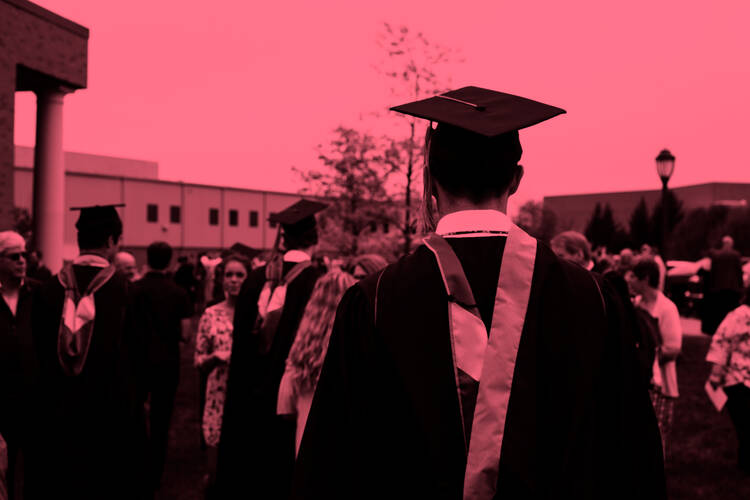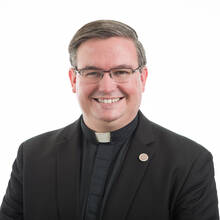Amid the recent tumult on university campuses nationwide, one reality became clear: We expect an incredible amount from our institutions of higher education. We invest their leadership with tremendous moral, social and political power. Do they deserve that power? What allows them to exercise it well?
This observation made me think of the late John O’Malley, S.J. Father O’Malley, who died in September 2022, was long recognized as “the dean of Catholic historians” and a leading interpreter of Western humanism. (A conference tomorrow, Feb. 3, at Fordham University will discuss his legacy.) In his book Four Cultures of the West, Father O’Malley offered a typology of four cultures regnant in the West. As was typical of Father O’Malley, he offered the study with depth but humility: He didn’t mean to say that these cultures were the only four, but that they were nonetheless important ones. Moreover, universities play an important role in Father O’Malley’s story, because they are the place where these cultures interact—particularly cultures two and three.
Briefly, the four cultures are: first, the prophetic culture of stark moral language, conversion, penance and reform, as with Martin Luther or Pope Gregory VII; second, the academic culture of analytic questioning, systematization and knowledge-seeking, as with Aristotle or Kant; third, the humanistic culture of Dante and William Blake, with its love of goodness and enduring wisdom; and, fourth, artistic culture, with its passion for ritual and fine art, as with Vivaldi or the great architects of medieval cathedrals.
Can American society, which is so divided by questions of truth, goodness and justice, look to universities for a new consensus on these terms and practices?
Father O’Malley thought that all four of these cultures were important to the modern West, but that conflict between two of them was particularly important for driving cultural change: the academic and humanistic cultures, represented by cultures two and three. These two cultures are inclined toward conflict in part because they are both self-reflective: They ask who they are and who they are not. Their conclusions and methods can seem to lead in opposite directions, as Father O’Malley writes: “If culture two seeks clear-cut definitions, [culture three], as least in this particular aspect, glories in ambiguity, in rich layers of meaning.”
The conflict between them is ancient: Much of Socrates’s legacy (as passed down by Plato and Xenophon) can be understood as a philosophical critique of poetry and its characteristic approaches to truth and human society. Further, to the extent that these cultures are divided over the primacy of the “good” and the “true,” then one expects their conflict to be fundamental and recurring.
In the modern period, this clash of cultures became important for a new reason. Prophets are famously divorced from institutions, and artistic culture is often wordless, and so without voice. But academic and humanistic cultures have been able to find robust institutional homes and megaphones. Historically, high schools represented the humanistic and the universities the academic, but in the contemporary university, they both appear and jostle for primacy. Thus the cultures are drawn into frequent conflict through this proximity.
Academic culture, particularly the hard sciences, has been able to raise money and institutionalize itself. One thinks of the incredible growth of scientific research in the United States after World War II, complete with funding from the federal government and the private sector. One only has to step foot on a college campus to see how much physical space the sciences take up at many schools. A physics lab is a great deal more imposing than the chalkboard of the humanities.
Meanwhile, the humanistic culture, with its concern for the human person and citizen, has also adapted along with changing notions of justice. Part of the story of the rise of diversity, equity and inclusion (D.E.I.), both as offices and as a broader movement, for instance, is the way that, at least in some circles, it has developed out of, and in turn influenced, the humanistic concern for the good of the citizen characteristic of Father O’Malley’s culture two. D.E.I. has reinforced the humanities’ concern for the social, and the concern for personal virtue has shifted toward a concern for social justice.
That concern for social justice, with its radical critique of society, also finds nourishment from another of Father O’Malley’s cultures, the prophetic, one that does not play much of a role in his account of the university. Even then, however, such recent developments only reinforce his point: there are many cultures at work in the university.
Cultures in conflict
In the 21st century, we expect universities to be places of research, teaching, social change, political innovation, economic catalysis and technological advancement. We want them to educate students as citizens and prepare students as workers, win sports championships, engage their local communities in socially responsible ways, promote peace and drive the economy. We want them to promote social mobility, excavate the past and pioneer the future. The university is called to supplement—if not replace—the task of government, religion, the market, social activists, coaches and sports teams, the hospital and the research laboratory, not to mention parents and family.
For Father O’Malley, it was inevitable that some of these aims would come into conflict. Universities have overlapping parts that do not always agree on their methods, goals and social purposes. And since these cultures are dynamic, any reconciliation or detente between them is temporary.
This conflict of cultures can go beyond the quad. Many outsiders see higher education as a place where the pursuit of truth and objectivity should reign supreme. Within higher education, however, the nature of truth has always been controversial. One key concern is a difference in belief as to whether truth is “objective” or “subjective,” although no doubt most people take a position in between extremes. Often enough, the more subjective truth is one that serves the good of persons and society, a truth that is useful or beneficial: “effectual,” in Machiavelli’s felicitous wording. It is not knowledge primarily for knowledge’s sake, but for social purposes.
Goodness is closely connected to justice, but we live in a society with vastly divergent notions of justice. We do not share many norms of justice, nor a sense of how it relates to freedom and equality. It’s not a surprise, then, that as the cultures battle out differing notions of justice within the university, the broader society pays attention.
This state of affairs raises a question: Can American society, which is so divided by questions of truth, goodness and justice, look to universities for a new consensus on these terms and practices? Or are universities themselves too internally divided on such questions? And, even if universities could help our culture think through such questions, will they be seen to have the credibility and authority to do so?
How does the quest for knowledge cohere with the building of character? Given the diverse cultures operative in how we think about the truth, what draws them together?
At the very least, public opinions of universities will be affected by the perceived divergence between norms of justice held in higher education, including D.E.I., and those held in wider society.
Another one, however, concerns the hypocrisy in the application of those norms of justice. Here I think John O’Malley is instructive again. If the humanistic culture of the universities has lately been influenced by a kind of radical social critique of the prophet, then it is borrowing from Father O’Malley’s first culture. And here we might say there is no one more offensive than the false prophet, the one claiming to hold society to radical standards to which he or she is not held accountable. This is what I took to be the sentiment behind recent comments from Maureen Dowd in The New York Times. She wrote:
I felt the same disgust with the Catholic Church sex scandal, seeing church leaders who were charged with teaching us right from wrong not knowing right from wrong. University presidents should also know right from wrong.
Ms. Dowd not only captures the sense that we hold university leaders to high moral standards, but by comparing them to Catholic bishops and priests, she suggests that they are themselves paragons of a prophetic moral code.
The Catholic response
None of these considerations absolve higher education from their considerable social and moral responsibilities. On the contrary, they help to frame those duties.
Catholic schools have a particular interest in these conversations because they have helped to develop the modern university from its medieval European model. And that is no accident. As witnesses to the unity of all knowledge, universities fundamentally bear witness to the unity of all reality, which in turn finds its unity in its divine creator and redeemer. Catholics are heirs to this intellectual tradition, but they also believe in that creator and are compelled to action in response to that divine charity. They are obliged to ask how these diverse parts cohere together as a harmonious whole.
Catholics thus have a responsibility to demonstrate the integrity of the university. That responsibility comes with its own questions. For example, what is a university, exactly? How does the quest for knowledge cohere with the building of character? Given the diverse cultures operative in how we think about the truth, what draws them together?
To put it another way: It is often said that Catholic universities have a commitment to be both “Catholic” and “university.” But what does that mean when the very notion of “university” is splintering? Here is an irony of modernity: Where once the notion of a “Catholic university” seemed to many a contradiction in terms, now it indeed seems one of the few solid instantiations of the university.
If universities are meant to be moral agents, then their leaders have to be formed appropriately. Elite universities worry about their leadership avoiding public relations problems or offending key constituencies. But just as the clerical sex abuse scandal raises questions about whether bishops have the “smell of the sheep,” so high-level debacles in higher education call for more attention to how such leaders are not only selected but formed, cultivated and held accountable. Jennifer Frey, for instance,noted that a university president is responsible to the board of trustees and faculty, which is quite true. But, if that is true, why should we see them as leaders of our society?
Perhaps more importantly, what happens when Catholic universities, which have for so long been leading agents of the Catholic faith in the U.S. and elsewhere, struggle to exercise that distinctively Catholic intellectual and moral leadership?
In arecent article, Bishop Robert Barron notes that the Catholic tradition of moral theology has a great deal to teach our society: Our culture is dominated by consequentialism and utilitarianism in its thinking on some of the most fundamental moral issues, but it is also haunted by the recognition that some actions are inherently wrong, such as sexual harassment or racial discrimination. Scholars who are so highly educated as presidents of Ivy League schools should be able to name something as always and everywhere wrong, even if they do not have the language of intrinsic evil at their disposal. There is room for both complexity and simplicity.
For Father O’Malley, at the core of the modern university are contending cultures that are liable toward conflict. This notion is nothing less than revelatory as we consider modern conflicts within universities and the larger question of their place within U.S. society. If higher education is to remain a viable home for reflective, contemplative capacities of our culture, then we need to ask serious questions about how we can shape them into spaces capable of rising to those ideals.
It might not be enough to weather all of the challenges universities face today. Then again, they are remarkably durable institutions, and they have weathered worse. And that is perhaps the greatest gift Catholics can offer universities: hope.








